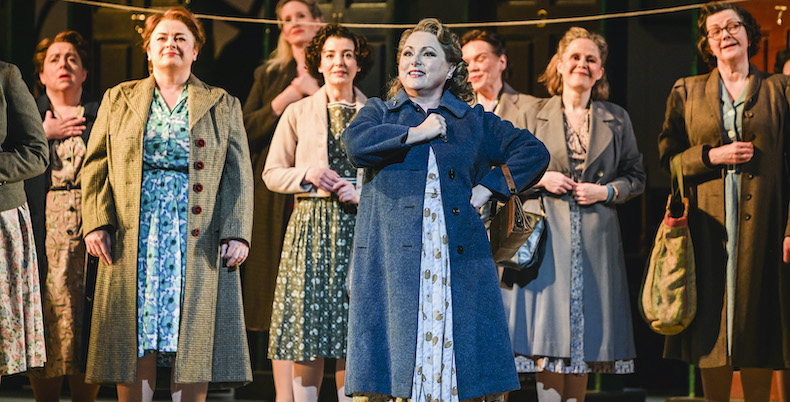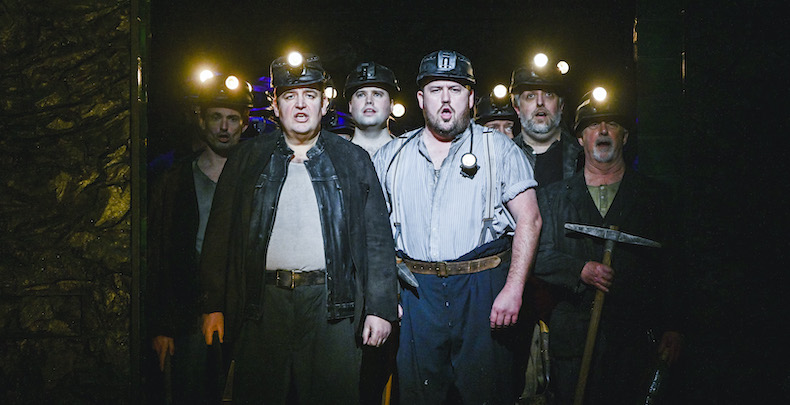The evening got off to a beautifully-moving start with the superb atmospheric Blaenavon Male Voice Choir entertaining us pre-show in the Circle Bar, including some truly moving numbers. I was hooked and couldn’t wait to see my very first opera.
Set in the 1950s, the Welsh National Opera’s Blaze of Glory focuses on a tight-knit Welsh mining community who form a male choir to help itself heal following a local mining disaster. Enter Mr Dafydd Pugh, the community’s heroic chorus master, together with Miss Nerys Price and a group of strong-minded women, who collectively create said choir.
Despite numerous hurdles along the way, Miss Price never lets the choir give up. She eventually takes the reins to become the first woman to lead a male voice choir – and then on to victory at the Royal Albert Hall.
The focus on how the power of music and community can heal aligns with the WNO’s aim to “highlight the historical significance of this tradition, the important role still played by modern male voice choirs within different communities, and the beneficial effects of singing on men’s mental health”.
The storytelling is conveyed beautifully through singing, packed with humour and almost slapstick-like moments, though in the first half I missed a lot as I was struggling to hear over the orchestra. As this was my first opera, I had no idea the words were being screened overhead! (Maybe a gentle nudge to the audience at the beginning?) This was a welcome help for the second half.
The scene changes were ingeniously seamless – turning the opening street scene to the pit; a bar to a charabanc. While the coal face – their heritage and livelihood – remains a constant reminder through the image of the pit wheel in the background.

The performance is filled with light and shade – from the uplifting bright and breezy opening song by the women, to the dark, brooding singing of the sooty miners in the dark; and from the contrasting traditional, moving singing of the male choir blended with the lighter, wittier style of the operetta cast.
There were many standout moments throughout the performance but perhaps the most memorable for me are the yodelling through the introduction of character Bryn Bevan (superb, funny and unexpected) and the fight at the local singing competition.
While Blaze of Glory lacks famous traditional arias, it more than makes up for this by beautifully executed traditional songs such as the very moving Calon Lân (a Welsh language song, originally written as a hymn in the early 1890s. It remains one of the most famous songs in Wales).
The power of the Blaenavon’s choir’s deeply moving singing combined with that of the operetta cast in the closing moment was powerful and uplifting and brought people to their feet.
While it wasn’t quite what I was expecting – sitting somewhere between a traditional opera and a musical – this was a brilliantly choreographed and well-executed performance. I personally would have welcomed more interaction with the Blaenavon choir (who just sang at the beginning and end of the performance) and more moving moments. But this is a feel-good operetta full of wit and comedic moments that will uplift and entertain.
Tickets from £13. Last show is at Bristol Hippodrome Saturday 25th April!
Main image: Image © Kirsten Mcternan
About the Welsh National Opera
Welsh National Opera is the national opera company for Wales, funded by the Arts Councils of Wales and England to provide large-scale opera, concerts and outreach work across Wales and to major cities in the English regions. It endeavours to provide transformative experiences through its education and outreach programme and its award-winning digital projects. With its partners, it works to discover and nurture young operatic talent and aims to show future generations that opera is a rewarding, relevant and universal art form with the power to affect and inspire.


